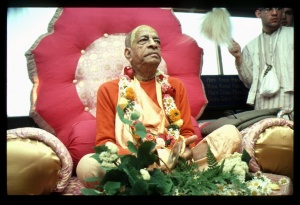CC Adi 12.70 (1975): Difference between revisions
(Vanibot #0027: CCMirror - Mirror CC's 1996 edition to form a basis for 1975) |
(Vanibot #0020: VersionCompareLinker - added a link to the Version Compare feature) |
||
| Line 2: | Line 2: | ||
<div style="float:left">'''[[Sri Caitanya-caritamrta (1975)|Śrī Caitanya-caritāmṛta (1975)]] - [[CC Adi (1975)|Ādi-līlā]] - [[CC Adi 12 (1975)|Chapter 12: The Expansions of Advaita Acārya and Gadādhara Paṇḍita]]'''</div> | <div style="float:left">'''[[Sri Caitanya-caritamrta (1975)|Śrī Caitanya-caritāmṛta (1975)]] - [[CC Adi (1975)|Ādi-līlā]] - [[CC Adi 12 (1975)|Chapter 12: The Expansions of Advaita Acārya and Gadādhara Paṇḍita]]'''</div> | ||
<div style="float:right">[[File:Go-previous.png|link=CC Adi 12.69 (1975)|Ādi-līlā 12.69]] '''[[CC Adi 12.69 (1975)|Ādi-līlā 12.69]] - [[CC Adi 12.71 (1975)|Ādi-līlā 12.71]]''' [[File:Go-next.png|link=CC Adi 12.71 (1975)|Ādi-līlā 12.71]]</div> | <div style="float:right">[[File:Go-previous.png|link=CC Adi 12.69 (1975)|Ādi-līlā 12.69]] '''[[CC Adi 12.69 (1975)|Ādi-līlā 12.69]] - [[CC Adi 12.71 (1975)|Ādi-līlā 12.71]]''' [[File:Go-next.png|link=CC Adi 12.71 (1975)|Ādi-līlā 12.71]]</div> | ||
{{CompareVersions|CC|Adi 12.70|CC 1975|CC 1996}} | |||
{{RandomImage}} | {{RandomImage}} | ||
==== TEXT 70 ==== | ==== TEXT 70 ==== | ||
<div class="verse"> | <div class="verse"> | ||
:caitanya-rahita | :caitanya-rahita deha--śuṣkakāṣṭha-sama | ||
:jīvitei mṛta sei, maile daṇḍe yama | :jīvitei mṛta sei, maile daṇḍe yama | ||
</div> | </div> | ||
| Line 32: | Line 31: | ||
<div class="purport"> | <div class="purport"> | ||
In the Śrīmad-Bhāgavatam, Sixth Canto, Third Chapter, twenty-ninth verse, Yamarāja, the superintendent of death, tells his assistants what class of men they should bring before him. There he states, | In the Śrīmad-Bhāgavatam, Sixth Canto, Third Chapter, twenty-ninth verse, Yamarāja, the superintendent of death, tells his assistants what class of men they should bring before him. There he states, "A person whose tongue never describes the qualities and holy name of the Supreme Personality of Godhead, whose heart never throbs as he remembers Kṛṣṇa and His lotus feet, and whose head never bows in obeisances to the Supreme Lord must be brought before me for punishment." In other words, nondevotees are brought before Yamarāja for punishment, and thus material nature awards them various types of bodies. After death, which is dehāntara, a change of body, nondevotees are brought before Yamarāja for justice. By the judgment of Yamarāja, material nature gives them bodies suitable for the reactions of their past activities. This is the process of dehāntara, or transmigration of the self from one body to another. Kṛṣṇa conscious devotees, however, are not subject to be judged by Yamarāja. For devotees there is an open road, as confirmed in Bhagavad-gītā. After giving up the body (tyaktvā deham), a devotee never again has to accept another material body, for in a spiritual body he goes back home, back to Godhead. The punishments of Yamarāja are meant for persons who are not Kṛṣṇa conscious. | ||
</div> | </div> | ||
Latest revision as of 14:49, 26 January 2020

A.C. Bhaktivedanta Swami Prabhupada
TEXT 70
- caitanya-rahita deha--śuṣkakāṣṭha-sama
- jīvitei mṛta sei, maile daṇḍe yama
SYNONYMS
caitanya-rahita—without consciousness; deha—body; śuṣka-kāṣṭha-sama—exactly like dry wood; jīvitei—while living; mṛta—dead; sei—that; maile—after death; daṇḍe—punishes; yama—Yamarāja.
TRANSLATION
A person without Kṛṣṇa consciousness is no better than dry wood or a dead body. He is understood to be dead while living, and after death he is punishable by Yamarāja.
PURPORT
In the Śrīmad-Bhāgavatam, Sixth Canto, Third Chapter, twenty-ninth verse, Yamarāja, the superintendent of death, tells his assistants what class of men they should bring before him. There he states, "A person whose tongue never describes the qualities and holy name of the Supreme Personality of Godhead, whose heart never throbs as he remembers Kṛṣṇa and His lotus feet, and whose head never bows in obeisances to the Supreme Lord must be brought before me for punishment." In other words, nondevotees are brought before Yamarāja for punishment, and thus material nature awards them various types of bodies. After death, which is dehāntara, a change of body, nondevotees are brought before Yamarāja for justice. By the judgment of Yamarāja, material nature gives them bodies suitable for the reactions of their past activities. This is the process of dehāntara, or transmigration of the self from one body to another. Kṛṣṇa conscious devotees, however, are not subject to be judged by Yamarāja. For devotees there is an open road, as confirmed in Bhagavad-gītā. After giving up the body (tyaktvā deham), a devotee never again has to accept another material body, for in a spiritual body he goes back home, back to Godhead. The punishments of Yamarāja are meant for persons who are not Kṛṣṇa conscious.